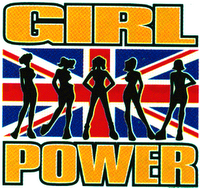 In an article entitled “Girl Power as Anarchism”, that appeared in The Guardian on Monday and has now been reprinted in this past Saturday’s Globe and Mail under the title “What Happened to Girl Power?”, John Harris writes about the legacy of girl power, ten years after the Spice Girls’ single “Wannabe” topped the charts.
In an article entitled “Girl Power as Anarchism”, that appeared in The Guardian on Monday and has now been reprinted in this past Saturday’s Globe and Mail under the title “What Happened to Girl Power?”, John Harris writes about the legacy of girl power, ten years after the Spice Girls’ single “Wannabe” topped the charts. Harris claims that despite heavy media criticism and the band being “shot through with absurdity and contradiction…their claim to be waging war on a testosterone-heavy consensus just about held up.” That the Spice Girls were a valid form of feminist thought is an argument I had with many people during those first heady years of Spicemania.
 The Spice Girls were widely criticized for declaring their maxim of “Girl Power” while dressing in revealing outfits and generally not being very cerebral. (I remember reading a Vogue interview where the author gave a list of words that the girls had to have defined during a conversation, one being “sibling.”) The irony of the situation was that critics divorced the women’s sexuality and intrinsic interests from the band’s explanation of Girl Power: we are going to do what we want to do and we’re not going to let men dictate what that is (which is basically a tenet of feminism). Critics wouldn’t let overt sexuality and an interest in fashion exist with feminist thought. But these two things are not mutually exclusive.
The Spice Girls were widely criticized for declaring their maxim of “Girl Power” while dressing in revealing outfits and generally not being very cerebral. (I remember reading a Vogue interview where the author gave a list of words that the girls had to have defined during a conversation, one being “sibling.”) The irony of the situation was that critics divorced the women’s sexuality and intrinsic interests from the band’s explanation of Girl Power: we are going to do what we want to do and we’re not going to let men dictate what that is (which is basically a tenet of feminism). Critics wouldn’t let overt sexuality and an interest in fashion exist with feminist thought. But these two things are not mutually exclusive.Being the feminist that I am, I can’t ignore the fact that many societal factors influence what women perceive as sexy or interesting. I shave my legs because I say I like the way it feels and looks, but really, through many subconscious avenues, I have been told that I like the way it feels and looks. But the basic underpinnings of the Spice Girls’ assertion were that you should feel good about yourself and not let anyone cut you down. Is this way of thinking so inconsequential and enslaved?
Harris mentions in his article that he read “The Whole Woman” by Germaine Greer, published in 1999, “when Spice hegemony was fading fast. ‘The Spice Girls did make a difference,’ [Greer] wrote, ‘because their most passionate fans were eight-year-old girls.’ A study of children's oral culture had found, in the post-Spice climate, that ‘whereas half the space in school playgrounds used to be taken up by a self-selecting group of boys playing football, girls' clapping and dancing games were taking over’.” The eight-year-old girls took on board the message of Girl Power and were putting it into action; and not by becoming part of the male world by playing football. They maintained their interests (just as the Spice Girls maintained theirs, as well as their sexualities), marrying that with a greater sense of self-worth and entitlement.
The Spice Girls are not the voiceless, nameless girls that we see splashed across men’s magazines. They may have dressed similarly to the nameless girls, but their voice was what set them apart. They took their notoriety and influence and changed the thinking and actions of little girls.
And all they really wanted? To “zigazig ha…”
No comments:
Post a Comment